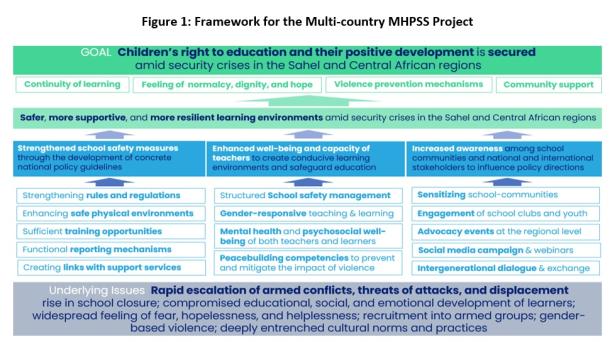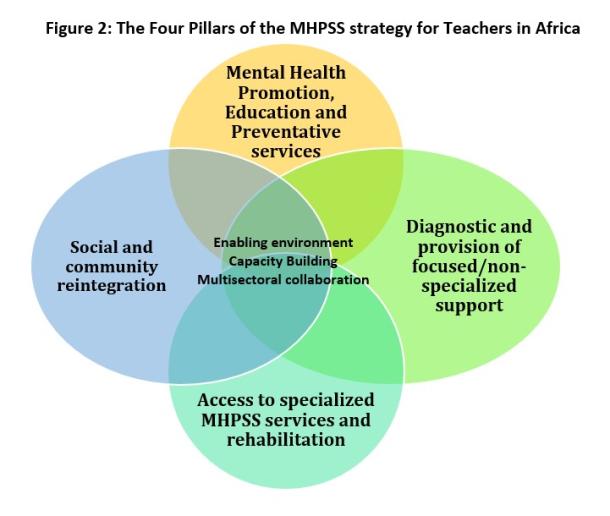Mental Health and Psycho-Social Support for Teachers in Africa
One of the challenges faced by the teaching profession today is that it is not sufficiently attractive in many countries, leading to teacher shortages. Many teachers feel burned out and without adequate mental health support. The COVID-19 pandemic revealed how stressful teaching can be. In parts of Africa, additional stress is related to contexts of emergencies, including conflicts. The WHO has reported a surge in depression and anxiety prevalence among teachers and, more generally, provided guidance on mental health. Together with partners, UNESCO IICBA has developed an ambitious program on mental health and psycho-social support (MHPSS) for teachers.
IICBA’s Work on MHPSS
UNESCO IICBA has been investing over the past few years in research, policy dialogue, and capacity enhancement on issues related to MHPSS for teachers in Africa. On this page you will find: (1) findings from IICBA research; (2) A brief explanation of the approach taken to support teachers and learners in contexts of emergencies through two new projects funded by the Government of Japan; and (3) a draft strategy being developed by the African Union on MHPSS for teachers and information on how to participate in the consultation for the strategy.
Findings from Research and Training Guide
An IICBA study conducted in 14 African countries reveals that a third of teachers and teacher educators were depressed, and one fifth to one fourth were affected by stress during the COVID pandemic. High levels of stress are contributing to teacher burnout, lack of engagement, job dissatisfaction, poor performance, and some of the highest turnover rates ever. Teachers are motivated by factors such as self-respect, feelings of accomplishment, relationship with the students, independence, and intellectual challenges. By contrast, a lack of favourable systems and social support mechanisms may lead to anxiety, burnout, and depression symptoms, impacting on the mental health and wellbeing of teachers.
Also of interest is a case study for Kenya considering burnout among teachers and university lecturers. Encouragingly, support mechanisms at the school or the use of least one coping mechanism at the personal level seem to be associated with lower burnout levels than otherwise.
Based on research and in partnership with UNESCO’s O3 (Our Rights, Our Lives, Our Future) programme, IICBA has implemented pilot training programs and developed with AHA Psychological Services a training guide on MHPSS for teachers. The guide was piloted through face-to-face trainings in several countries (see this progress report).
Projects
IICBA recently received funding from the Government of Japan for two new pilot projects to be implemented in 2024-25 on MHPSS in contexts of emergencies, one in Ethiopia and the other across four countries. The first project targets the northern regions of Ethiopia that endured two years of conflict from 2020 to 2022. The project aims to support teachers’ and students’ mental and emotional well-being by integrating MHPSS in schools. The initiative will be implemented with the Federal Ministry of Education, Regional Education Bureaus, teacher training institutions, and school communities in the Afar, Amhara, and Tigray regions of Ethiopia. The second project targets Sahel countries and South Sudan. It seeks to create safer, more supportive, and more resilient learning environments (see Figure 1 for the framework; the framework for the Ethiopia project is similar).

An Africa-wide MHPSS Strategy
IICBA is supporting the African Union to develop a strategy on MHPSS for teachers. The draft strategy is organized into four pillars and three cross cutting priorities (Figure 2). The four pillars are: (i) preventive services; (ii) diagnostic and provision of focused, non-specialized support; (iii) access to specialized services and rehabilitation; and (iv) and social/community reintegration. The three cross-cutting interventions are: (i) enabling environment; (ii) capacity building of institutions and stakeholders; and (Iii) multisectoral collaboration. The draft strategy also identifies the roles and responsibilities of different stakeholders, such as the African Union, Member States, Regional Economic Communities, development partners, civil society organizations, teacher unions, employers, and the health sector for a comprehensive approach to addressing the MHPSS needs of teachers in Africa.


